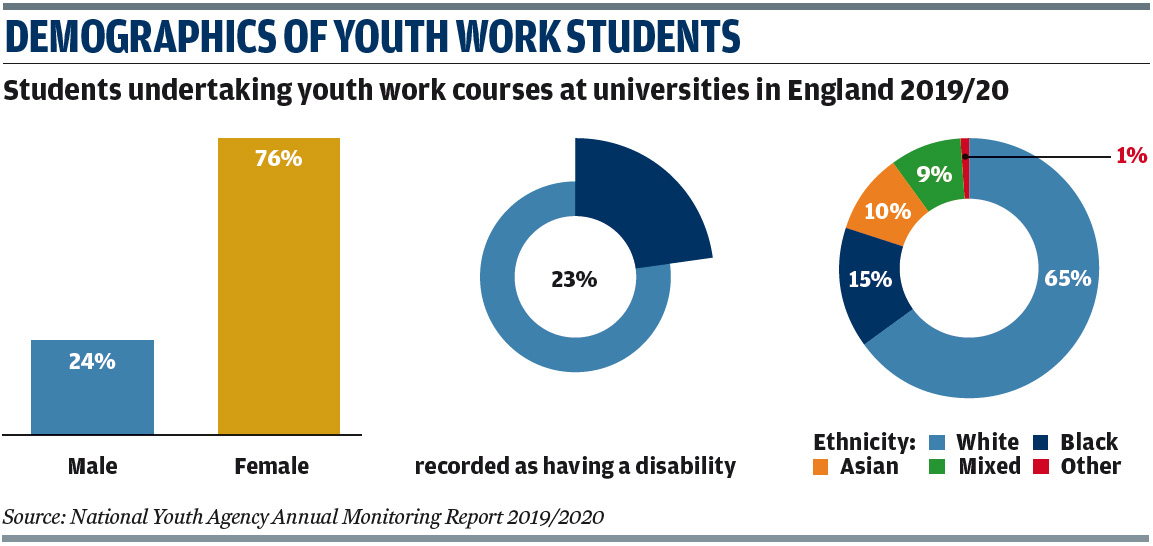
Workforce
The NYA is calling for the recruitment and training of 10,000 qualified youth workers, 20,000 youth support workers and 40,000 volunteers. In the past, youth work was mainly delivered by local authorities but today is delivered by a range of organisations such as housing programmes, voluntary organisations, within the NHS, and in social care or youth justice.
Salary
At a local authority level, youth workers can be youth support workers, with Level 2 and 3 qualifications or professional youth workers at Level 6 and above. Youth and community support workers receive between £19,308 and £28,787 while a professional youth worker earns between £25,513 and £42,718. Revised pay rates are negotiated annually by the Joint Negotiating Committee (JNC), which comprises a staff side and an employer side.

Qualifications
The JNC endorses youth work qualifications via the NYA. Level 2 and 3 qualifications are available from a range of awarding bodies. The government-funded NYA Youth Bursary Fund is offering 547 bursaries for Level 2 and 3 courses in 2022/23. For the first time the funding will support access to leadership and management modules and assessor training. A Level 3 Youth Support Worker apprenticeship was approved in December 2020 and a Level 6 apprenticeship will be available in 2023.
Youth work degree courses must be JNC-recognised to confer the status of qualified youth worker. Degrees are evolving to reflect roles outside traditional youth work settings with modules covering social care, health and business development. Level 6 qualifications include the BA (Hons), which is three years full-time, and can also be studied part time. Level 7 qualifications include full- or part-time postgraduate diplomas or masters.
Early findings from the NYA’s ongoing census reveal 34 per cent of youth work organisations have staff with JNC youth work degrees and 40 per cent have staff with youth work qualifications at Level 2 or above. Data will be used to feed into the development of the NYA’s workforce strategy, which it hopes to publish soon.
Recruitment
In its 2019/20 annual monitoring report, published in October 2021, the NYA found the number of higher education institutions offering youth work courses, the number of courses and number of students were at a record low. De Montfort University recently announced it was suspending intake for its Youth and Community Development course from this month [September 2022] due to significantly lower recruitment rates and the financial impact of the pandemic. However, at least five new courses have been validated during the last year. “We’ve seen an increase in the number of universities that are expressing interest in delivering a youth work degree and also engagement from universities that want to come on board to deliver the apprenticeship degree,” says McLatchie.
Post-qualifying training
The NYA’s Youth Work Academy is a digital platform bringing together low-cost and free training courses and webinars.
The NYA launched a government-funded media literacy and digital youth work course in April 2022, and a new CPD module on trauma-informed practice in May 2022. It is developing further training on working with gypsy and traveller young people, detached youth work and safeguarding. In October, Level 4 and 5 qualifications will be available for youth workers keen to specialise or working in other professions such as youth justice.
The NYA’s Youth Work Tea Breaks and Supper Breaks, which enable practitioners to come together and explore common themes, continue to run with a range of partner organisations. The Equal Equity programme continues to support youth workers from minority ethnic backgrounds, and the NYA is also developing support for LGBTQIA youth workers and faith sector providers.
Youth Work Register
The NYA plans to launch a voluntary register for professionally qualified Level 6 and 7 youth workers this year, to be administered and managed by a sub-group of its Education and Training Standards Committee.
Meet the practitioner
 Kelly Crofts, senior officer for young people, Sandwell Council
Kelly Crofts, senior officer for young people, Sandwell Council
Aged 16, Kelly Croft had passed her GCSEs but felt aimless. “I wasn’t in a good place,” she says. During work experience at Sandwell Council she shadowed a youth worker, who asked her to chair the local youth forum then suggested she apply for a job in the youth service. The youngest youth worker Sandwell had ever employed, Croft was supported to achieve Level 2 and 3 youth work qualifications and a foundation degree. Some 22 years later she manages the council’s targeted offer, having spent a few years working in social care. “My youth work skills helped me build relationships with the young people I was working with and the skills I developed in social care now feed into my youth work,” she says.
As well as managing her team and overseeing and developing the council’s targeted work Croft continues to work directly with young people, including specialist one-to-one work with young women who have been exposed to exploitation. She has also developed youth work support packages for children leaving care.
Read more in CYP Now's Children’s Workforce Guide to Qualifications and Training

